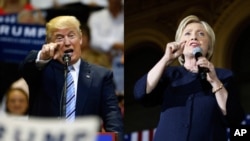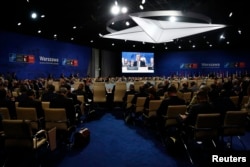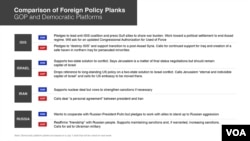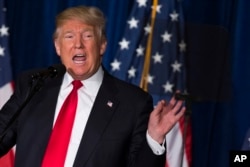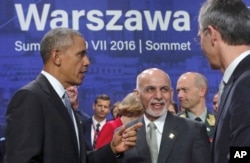In his acceptance speech at the Republican convention Thursday night, Donald Trump laid out a foreign policy vision that marked a sharp departure from that of his Democratic rival, Hillary Clinton.
Trump claimed that many U.S. allies take Washington’s support for granted, and countries should contribute more financially for U.S. security guarantees in order to ensure that American troops will come to their aid.
But while Trump clearly holds unorthodox views, his party’s official platform, adopted by the convention delegates this week, is seen as a more traditional Republican document, and on a host of foreign policy issues – from Russia to China to Syria – it mirrors the draft put out by Democrats.
The platform, a statement of party principles and ideas, is a non-binding document, but it does serve as a road map for presidential candidates. Party nominees, even when they espouse unconventional views, tend not to veer far from its positions.
With its emphasis on the use of diplomacy and economic development, the Democratic platform embraces what is known as idealism, a school of foreign policy that holds that America is a force for good in the world and that, with a combination of military strength and soft power, can shape global affairs. More than twice as long on foreign policy as the Democratic version, the Republican platform presents a harder-edged, Reaganesque manifesto with some, but by no means all, of Trump's controversial ideas.
“There is a huge conceptual difference between the two platforms,” said David Coates, a professor of political science and international affairs at Wake Forest University in Winston-Salem, North Carolina. “One is harder; the other is softer.”
Hard vs soft
Invoking Ronald Reagan’s mantra of “peace through strength” and Trump’s own call for a military build-up, the Republican platform puts forth a muscular foreign policy sustained by military might, “a Reagan-era force that can fight and win two and half wars, ranging from counterterrorism to deterring foreign aggressors.”
While calling for American global leadership and “the strongest military in the world,” the Democrat Party’s draft platform says that “war must always be the last resort” and stresses the need for the “smart use of diplomacy, development, and economic statecraft.”
“Democrats further believe that when America leads, it should be as a principled force for peace and prosperity in the world,” the draft reads.
Nowhere are the two platforms further apart than over the question of America’s role in international alliances. On the campaign trail and in interviews, including a recent interview with the New York Times, Trump has disparaged NATO members for failing to “pay their bills” and demanded that alliance members shoulder a larger military burden.
The Republican platform reflects some of that thinking, asking for a renewal of the 67-year-old alliance and demanding that NATO members “fulfill their commitments and meet their need for greater investment in their armed forces.” It also says that the U.S., while working through NATO and other multilateral organizations, “must always reserve the right to go its own way.”
The Democratic platform criticizes what it calls Trump’s desire to “abandon our NATO allies” and goes on to say, “We believe in strong alliances and will deter Russian aggression, build European resilience, and protect our NATO allies.”
Iran
On at least two other major foreign policy planks – Iran and Israel -- the platforms differ sharply.
On Iran, the Democratic platform expresses support for the 2015 nuclear deal signed between Iran and major world powers while the Republican platform takes a more hawkish stand, calling it “a personal agreement between the president and his negotiating partners and not binding on the next president.”
Echoing hardline Republican criticism of the nuclear deal, the Republican platform questions its legality by saying that “(w)ithout a two-thirds endorsement by the Senate, it does not have treaty status.”
The Democratic platform credits the deal with blocking Iran’s ability to build a nuclear weapon but nevertheless vows to “strengthen non-nuclear sanctions” if necessary.
Israel
Bipartisan support for Israel has long been a cornerstone of American foreign policy. Both platforms offer unequivocal support for the Jewish state, but a subtle change in the Republican plank separates the two parties.
In a break with long-standing U.S. policy, the Republican platform has removed any reference to a “two-state solution” to the Israeli-Palestinian conflict. It calls Jerusalem the “eternal and indivisible” capital of Israel and says it wants the U.S. embassy to be moved there from Tel Aviv.
Trump last week praised the platform as “the most pro-Israel of all time” after antagonizing many Israelis and their American allies with a comment that he’d remain “neutral” in any peace negotiations between Israelis and Palestinians.
The Democratic draft retains the two-state solution language. It says the status of Jerusalem is a matter of final negotiation between Israelis and Palestinians, but should nonetheless remain the capital of Israel.
The status of Jerusalem has proven a deal breaker in Middle Eastern peace negotiations, and the change in the Republican plank’s wording, seemingly trivial, is consequential for a final political settlement.
Islamic State
The Democrats pledge to lead the anti-Islamic State coalition while working toward a political settlement to end the Syrian regime of Bashar al-Assad. The Democratic platform doesn’t incorporate policy initiatives that Clinton has advocated as a candidate, including the creation of a no-fly zone in northern Syria and a ramp-up of the bombing campaign.
As a candidate, Trump has said he’d step up the bombing campaign to “knock out” IS and stop buying oil from Saudi Arabia if it doesn’t contribute troops to the fight against the Islamic State. Recently, he said he’d ask Congress to declare war on the terrorist organization and commit NATO to fight it. And in the New York Times interview, he said getting rid of IS is “much more important to us than Assad.”
But little of that rhetoric is to be found in the Republican platform. The manifesto blames President Barack Obama and then-Secretary of State Clinton for “mishandling” the 2011 Arab Spring and failing to “rally the world” against Assad. It backs “the transition to a post-Assad Syrian government” and calls for continued support for Iraq and the creation of a safe having in northern Iraq for refugees fleeing from ISIS.
China
Both platforms are censorious of Chinese trade practices and growing military posturing in the South China Sea.
The Republican platform reads: “China’s behavior has negated the optimistic language of our last platform concerning our future relations with China.” It goes on to criticize Chinese currency manipulation and calls for parity in trade as well as religious freedom.
The Democratic platform similarly slams Chinese currency and trade practices and pledges to “press China to play by the rules.”
But while both platforms take a tough stand on China ally North Korea, the Republican platform goes a step further, not only calling for dismantling the communist dictatorship’s nuclear arsenal but also imploring China “to hasten positive change on the Korean Peninsula.”
Russia
The two platforms offer tough rhetoric about Russia despite Trump’s campaign statement that he’d “get along very well” with Russian President Vladimir Putin. Contending that a weak Obama Administration has invited Russian aggression, the Republican platform supports maintaining sanctions on Moscow and “if warranted, increasing sanctions” until Ukraine’s sovereignty is restored, a reference to Russia’s 2014 annexation of Crimea and continued support for separatists in eastern Ukraine.
The Democratic platform reads: “We will make it clear to Putin that we are prepared to cooperate with him when it is in our interest—as we did on reducing nuclear stockpiles, dismantling Iran’s nuclear program, sanctioning North Korea, and resupplying our troops in Afghanistan—but we will not hesitate to stand up to Russian aggression.”
Afghanistan/Pakistan
On Afghanistan and Pakistan, the policy differences are hardly noticeable. The Democratic draft supports President Obama’s recent decision to keep 8,400 American troops in Afghanistan into next year and to press Pakistan to deny save haven to terrorists.
While the Republican platform takes a swipe at the Administration’s “feckless treatment of troop commitments” to Afghanistan, it does not oppose Obama’s decision. Trump has said he wants to keep some troops in the country.
“A Republican president will work with all regional leaders to restore mutual trust while insisting upon progress against corruption and the narcotic trade that fuels insurgency,” the Republican platform reads, adding that the new president will work to strengthen “historic ties” with Pakistan.
Before each party convention, platform committee members fight over changes small and big to their party's manifesto but because it’s a nonbinding document, few can hold their candidate to it.
“Truth be told, it’s not going to matter,” said Eric Brakey, a Republican State Senator from Maine and a member of the Republican platform committee, who voted against the platform. “The platform is almost 100 pages long. After the convention, no one is going to read it.”




